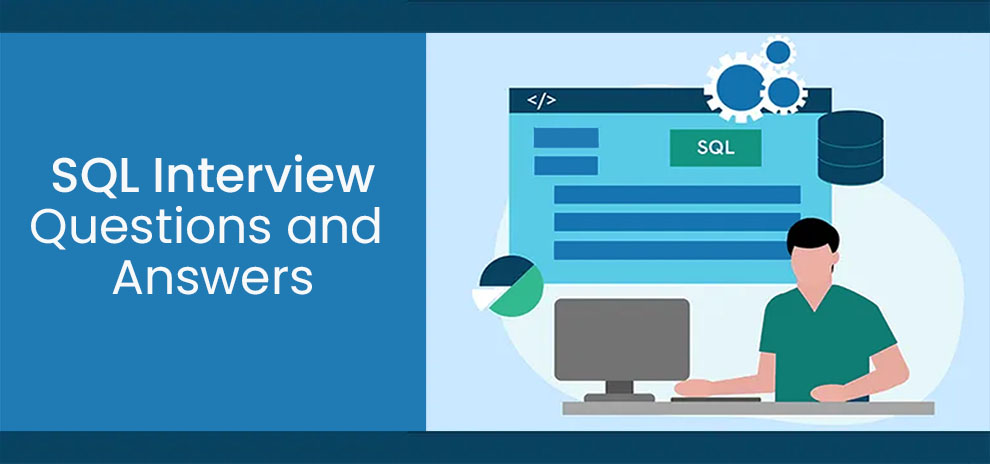What is SQL? SQL expanded to Structured Query Language, a domain-specific programming language employed to interact with the database. So, you can utilize SQL to make a database, create tables in the database, update the table in the database, or retrieve data.
There has been a surging demand for SQL programming skills because of its vast applicability in Database Management Systems (DBMS) in every software application.
Do you too want to work in this field? If yes, crack an interview and land a job. You will have to face multiple SQL interview questions and answers to pass the interview. Answering the SQL query interview questions and answers will however not be easy.
Jump To
- 5 Basic SQL Commands
- Writing SQL Queries
- Top SQL Queries Asked In Interview
- Other SQL Interview Preparation Questions for Practice
- Conclusion
Hence, you need to go through SQL query questions and answers for practice. It will be easier for you to ace the SQL test questions and answers when you are well aware of what to expect.
To help you, we have prepared this guide with 100 SQL interview questions and answers for freshers and experienced learners. But, before we discuss the top 100 SQL query interview questions and answers, there are two more important things that you must know. Let us look at them.
What Are The Five Basic SQL Commands?
Before hopping on to the SQL queries for interviews, it is important to understand these five basic SQL commands:
1. DDL or Data Definition Language
It changes the table structure by deleting a table, creating a table, altering a table, etc. The DDL commands are auto-committed. It implies that they automatically save all the changes into the database. A few commands covered under DDL include Truncate, Drop, Alter, and Create.
2. DML or Data Manipulation Language
This command helps modify the database, and it aids in all the changes in the database. It is not an auto-committed command. So, it will not permanently save the changes in the database. You can roll back. A few commands covered under DML include Delete, Update, and Insert.
3. TCL or Transaction Control Language
You can only use the TCL commands with DML. These operations are automatically committed to the database. So, you cannot use them while dropping or creating tables. A few commands covered under TCL include Savepoint, Rollback, and Commit.
4. DCL or Data Control Language
Such commands help grant or revoke authority from any database user. A few commands covered under DCL include Revoke and Grant.
5. DQL or Data Query Language
It helps fetch data from the database. There is only one command under it – Select.
How Do I Write A SQL Query – Helpful Tips
Before discussing SQL query questions and answers for practice, you must also know how to write a SQL query. You should be well-acquainted with all SQL queries examples with answers. Here are some steps to assist you:
- Use the proper formatting while writing the query. It amplifies readability and makes troubleshooting and reviewing easier.
- Pick the SELECT field and not SELECT *. The latter helps obtain the data from the table. So, you must use it unless you need all the data for the given condition. Hence, when you use the SELECT with specific fields, it optimizes the query.
- Eliminate correlated subqueries if not required.
- If you need only limited results, you can use the LIMIT statement. It helps show only the specified records.
- You use the DISTINCT clause to acquire distinct results from the query. It eliminates the duplicates but increases execution time. So, if not needed, avoid the DISTINCT clause. Alternatively, you can use the GROUP BY clause.
- Functions help perform specific actions, but they are inefficient because they do not promote index usage. Consequently, it slows the execution time. Hence, avoid the functions in predicates for query optimization.
- To amplify query execution, avoid OR, NOT, AND operators.
- HAVING clause is employed with the GROUP BY clause. The two enforce conditions. On the other hand, you cannot use the WHERE clause with aggregate functions. But, the HAVING clause does not promote index usage as it slows the query execution time. Hence, you must use WHERE over HAVING whenever possible.
- Opt for the INNER JOIN clause over the WHERE clause for creating joins.
- Do not use Wildcard Characters at the start of the LIKE clause pattern. The Wildcard Characters filter the results from the LIKE clause. So, never use them at the pattern’s beginning as it disables the data from utilizing the index. Consequently, a full table scan is needed to match it. It can take a lot of time and resources. Hence, use wildcard characters at the end.
An SQL expert must be familiar with SQL queries examples with answers. So, we hope this guide on writing a query serves your purpose. Now, let us address these SQL interview questions and answers for experienced and freshers one by one.
Top 100 SQL Query Interview Questions
1. What Are The Basic Interview Questions In SQL?
One of the most common errors students make during SQL interview preparation is they ignore the fundamentals. Often the SQL basics for interviews can make or break your selection. Below, we have a few such questions and SQL queries for interview.
Ques 1. What is the difference between SQL and MYSQL?
Ans. It is one of the most asked SQL interview questions and answers. Hence, you must memorize this during your interview.
As a response to this interview question, you can say:
- SQL is a Structured Query Language based on the English language, but MySQL is a DMBS.
- SQL is the core of RDBMS employed for managing and accessing the database, but MySQL is an RDBMS.
Ques 2. What is a database?
It is another one of the top SQL query interview questions and answers. As a potential SQL expert, you may work on several SQL query questions and answers for practice, but you cannot ignore these SQL basics for interview.
Ans. It is an organized collection of structured data. You can manage, access, store, or retrieve them digitally from the local computer system or remotely. Databases can be vast and complex. They have a fixed modeling approach and design. You can store smaller databases on a file system, but the larger ones are on cloud storage or computer clusters.
Ques 3. What is the difference between RDBMS and DBMS?
Ans. DBMS is a software app that aids in building and maintaining databases. RDBMS is a sub-set of DBMS. It is based on DBMS’s relational model. Hopefully, now you will not make any errors with these SQL query interview questions and answers. Now, let us move ahead to the following SQL interview questions and answers for freshers and experienced.
2. SQL Interview Questions For Data Analyst
Here are some SQL queries for interviews commonly asked to potential data analysts. Please be thorough with SQL queries examples with answers when you apply for a role as an analyst.
Ques 4. How do we use the DISTINCT statement?
It is one of the most common interview question for experienced people. Please memorize this during your SQL interview preparation.
Ans. The DISTINCT statement and SELECT statements work together. It helps when the record has duplicate values. So, when you use this statement, it will pick different values from the identical records. Interviews may also ask this in SQL queries examples with answers.
Syntax: SELECT DISTINCT column_name(s)
FROM table_name;
Ques 5. What are tables and fields?
It is one of the most prevalent SQL query interview questions and answers. Even though it is fundamental, many candidates fumble when asked such SQL basics for interview.
Ans. A table contains a data set organized in a structured model with rows and columns. Rows are horizontal, and columns are vertical. Every table has a specified number of columns or fields, but there can be any number of rows or records.
Ques 6. Suppose there are five records in the A table and two in the B table. So, how many rows will you see in the result of the following SQL query?
Select * From A, B
It is one of the top SQL queries asked in interviews. What should be the response to such SQL test questions and answers?
Ans. This SQL query will result in 10 rows as the cross join or cartesian product, the default, anytime the where clause is absent.
3. SQL Interview Questions and Answers For Freshers
Now, we will discuss SQL developer interview questions and answers for freshers. Let us discuss these SQL query questions and answers for practice:
Ques 7. Does SQL support programming language features?
It is one of the SQL advanced interview questions and answers. Most students invest so much time in SQL queries examples with answers that they ignore some trivial SQL test questions and answers. So, when asked, they lose precious marks on these SQL queries for interviews.
Ans. SQL is a language, but it does not support programming because it is not a programming language. SQL is a command language. There are no conditional statements in SQL but only commands.
Ques 8. What is a subquery?
You must have practiced SQL queries, but do you know what a subquery is? It is often one of the top SQL queries asked in interviews.
Ans. Query inside the statements like UPDATE, INSERT, DELETE, or SELECT is the subquery. A subquery may also exist inside the subquery. It is also known as inner select or inner query. The statement with a subquery is called the outer select or outer query.
Ques 9. How to create a table in SQL?
This question helps examine your SQL basics for interview.
Ans. In SQL, the command to create a table is very straightforward. So, here is the response to these type of SQL interview questions and answers:
CREATE TABLE table_name (
column1 datatype,
column2 datatype,
column3 datatype,
….
);
4. Tricky SQL Queries For Interview
Here are some tricky SQL query interview questions and answers. These may not necessarily be the SQL advanced interview questions and answers, but you cannot ignore them during your SQL interview preparation.
Ques 10. What is a primary key, and what is a foreign key?
Knowing SQL basics for interviews tells the interviewer how serious you are about the job. Hence, you must be particularly careful with SQL developer interview questions and answers.
Ans. A primary key contains unique values and identifies every record or row in the database table. There are no duplicate or null values in the primary key columns. A table has just one primary key, and it will have one or multiple fields.
Also known as a referencing key, a foreign key helps link two tables together. It is a column or a combination of multiple columns whose values are same as the primary key in the difference table. Typically, the foreign key works like a cross-reference between the table as it references the primary key from another table and identifies the relationship between the two.
Hopefully, you will not make a mistake in these SQL interview questions and answers. Now, let us move on to the 11th SQL advanced interview questions and answers.
Ques 11. Create an SQL query to extract the FullName and EmpId of all the employees working under the manager with ID – ‘201’.
Such SQL queries for interviews are standard. So, practice several such SQL test questions and answers.
Ans. Employee Details can help find the employee details. Here is the clause:
SELECT FullName, EmpId
FROM EmployeeDetails
WHERE ManagerId = 201;
Ques 12. What is normalization?
There is no shortage of SQL query interview questions and answers. But, elementary questions are also vital for SQL interview preparation. SQL basics for interviews is more important than thought.
Ans. Normalization is a method to avoid data duplication in the table.
5. Scenario-Based SQL Interview Questions And Answers For Experienced Professionals & Freshers
You may encounter several SQL advanced interview questions and answers. Typically, these are scenario-based SQL queries for interviews that help assess your in-depth understanding and knowledge of SQL. Some of these questions are:
Ques 13. What is faster – EXISTS or IN?
Ans. Given the vast subquery results – IN is slower than EXISTS as the former will provide a value, whereas EXISTS will give a Boolean value.
Ques 14. Create an SQL query to fetch several projects from the EmployeeSalary table.
Ans. The EmployeeSalary table will have values that correspond to every employee. So, there will be duplicate project values when you extract them from the table. Hence, we will use the distinct clause to get only the unique values from the Project.
SELECT DISTINCT(Project)
FROM EmployeeSalary;
Ques 15. Create an SQL query to print the FIRST_NAME from the Worker table, but replace ‘a’ with ‘A.’
Ans. The required query is:
Select REPLACE(FIRST_NAME,’a’,’A’) from Worker;
6. SQL Interview Questions and Answers For Experienced Learners
The interviewer may check your foundational knowledge and SQL basics for interview is important. So, during your SQL interview preparation, focus on all kinds of questions and SQL queries for interview success.
Ques 16. What is the highest value that a BYTE field can store?
Ans. The highest value that a BYTE field can store is 255 (from -128 to 127).
Ques 17. Is MySQL query case-sensitive?
Ans. No MySQL is not case-sensitive by default. So, the below-listed queries are the same.
SELECT * FROM `table` WHERE `column` = ‘value’
SELECT * FROM `table` WHERE `column` = ‘VALUE’
SELECT * FROM `table` WHERE `column` = ‘VaLuE’
Ques 18. What will be the SQL query if you need to find the employees’ average, minimum, and maximum salaries?
Ans. The aggregate function can help find the average, minimum, and maximum salaries.
SELECT AVG(Salary),
Min(Salary),
Max(Salary)
FROM EmployeeSalary;
Other SQL Interview Preparation Questions For Practice
Here are a few other SQL developer interview questions and answers & SQL queries for interview.
Ques 19. How many clustered indexes can you have in a table?
Ques 20. What are the features of MySQL?
Ques 21. What are the different kinds of subquery?
Ques 22. What are the ACID properties that guarantee that database transactions are reliably processed?
Ques 23. Which amongst the following is the DML command?
A. GRANT B. INSERT C. CREATE D. UPDATE E. TRUNCATE
Ques 24. When did SQL launch?
Ques 25. Name a few disadvantages of MySQL.
Ques 26. What is the difference between the WHERE and HAVING clause?
Ques 27. Talk about some applications of SQL.
Ques 28. What is DCL commands?
Ques 29. Write an SQL query to clone a new table from another table.
Ques 30. What are some indexes in SQL?
Ques 31. What do you understand by data integrity?
Ques 32. Write an SQL query to show the current date and time.
Ques 33. How to delete duplicate records?
Ques 34. What is ROWID?
Ques 35. What is data integrity?
Ques 36. What is the Difference between GRANT and WITH GRANT while Giving Permissions to the User?
Ques 37. What are entities and relationships?
Ques 38. What is the temp table?
Ques 39. How can you fetch alternate records from a table?
Ques 40. What are the different kinds of normalization?
Ques 41. Name the elements in the SQL language.
Ques 42. What is the difference between global and local temporary tables?
Ques 43. What is the need for group functions in SQL?
Ques 44. State the difference between IN and EXISTS.
Ques 45. How to use an explicit cursor in PL/SQL?
Ques 46. What are the possible results of CHECK constraints?
A. True B. False C. UNKNOWN D. All of the above
Ques 47. What is the command to insert multiple rows in SQL?
Ques 48. How to check the leap year?
Ques 49. How to find a duplicate record?
Ques 50. What is the difference between CHAR and VARCHAR?
Ques 51. What is the SQL query to show one row twice in results from a table?
Ques 52. Explain UNION, MINUS, and INTERSECT commands.
Ques 53. When is Materialized View better than the View?
Ques 54. What is the difference between TRUNCATE and DROP statements?
Ques 55. State the difference between DELETE and TRUNCATE.
Ques 56. What is SQLCMD?
Ques 57. When would you decide to use a zero or blank space over a NULL value in a row?
Ques 58. What are the factors to check during database testing?
Ques 59. What is an ER diagram?
Ques 60. What is denormalization?
Ques 61. Name the different clauses used in SQL.
Ques 62. What is Referential Integrity Constraint?
Ques 63. What are Tuple and tuple functions?
Ques 64. What is the statement to add a new row in the database table?
Ques 65. Do you read? What is your favorite SQL book?
Ques 66. Can we embed Pl/SQL in SQL?
Ques 67. Explain the purpose of the NVL function.
Ques 68. Write an SQL query to fetch intersecting records of two tables.
Ques 69. What is the SQL query to find the fifth-largest salary? You cannot use the limit or TOP method.
Ques 70. What is a stored procedure?
Ques 71. Name different joins in SQL.
Ques 72. Talk about the column comparison operators in MySQL.
Ques 73. Write an SQL query to fetch the last five records from a table.
Ques 74. Table variable and a temporary table – What is faster?
Ques 75. The DISTINCT keyword allows a function to consider only non-duplicate values. True or False?
Ques 76. How can you select all the even number records from a table?
Ques 77. What about all the odd number records?
Ques 78. Point out the difference between SUBSTR and INSTR.
Ques 79. Is it possible to sort a column with a column alias?
Ques 80. How many TRIGGERS are allowed in the MySQL table?
Ques 81. In a database, what do you understand by Materialized view?
Ques 82. How do you find the MAX Salary without using the MAX function?
Ques 83. What happens at the checkpoint?
Ques 84. How do you return a value from a stored procedure?
Ques 85. Explain different JOIN in SQL.
Ques 86. What are composite keys?
Ques 87. How to change a table name in SQL?
Ques 88. State the differences between the Star and Snowflake Schema
Ques 89. What is data-driven testing?
Ques 90. What are Schema Objects?
Ques 91. What is the trigger in SQL?
Ques 92. State the differences between OLAP and OLTP.
Ques 93. What is a View? State its uses.
Ques 94. What is Data Mining?
Ques 95. What is a recursive stored procedure?
Ques 96. What are clustered indexes and non-clustered indexes?
Ques 97. What are the different types of relationships?
Ques 98. What is NOLOCK?
Ques 99. Name the operator which is used in the query for pattern matching.
Ques 100. What does SELECT 3/2 return? 1 or 1.5?
This brings us to the end of top SQL queries for interviews.
Related: Selenium interview questions & answers,Python interview questions & answers
Conclusion
So, these are the top 100 SQL interview questions and answers. We have covered everything from SQL basics for interviews to advanced questions. Hopefully, you can ace your interview if you prepare these questions and SQL queries examples with answers.





